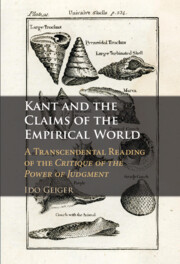 Kant and the Claims of the Empirical World
Kant and the Claims of the Empirical World Book contents
- Kant and the Claims of the Empirical World
- Kant and the Claims of the Empirical World
- Copyright page
- Dedication
- Epigraph
- Contents
- Acknowledgments
- Abbreviations
- Introduction
- Chapter 1 The Charge of Reflective Judgment and the Conceptual and Aesthetic Purposiveness of Nature
- Chapter 2 Organisms, Teleological Judgment and the Methodology of Biology
- Chapter 3 The Antinomy of Teleological Judgment
- Chapter 4 Discursivity and the Conceptual Purposiveness of Nature
- Chapter 5 The Significance of Form and the Aesthetic Purposiveness of Nature
- Conclusion: Kant’s Empiricism
- References
- Index
Chapter 1 - The Charge of Reflective Judgment and the Conceptual and Aesthetic Purposiveness of Nature
Published online by Cambridge University Press: 30 April 2022
- Kant and the Claims of the Empirical World
- Kant and the Claims of the Empirical World
- Copyright page
- Dedication
- Epigraph
- Contents
- Acknowledgments
- Abbreviations
- Introduction
- Chapter 1 The Charge of Reflective Judgment and the Conceptual and Aesthetic Purposiveness of Nature
- Chapter 2 Organisms, Teleological Judgment and the Methodology of Biology
- Chapter 3 The Antinomy of Teleological Judgment
- Chapter 4 Discursivity and the Conceptual Purposiveness of Nature
- Chapter 5 The Significance of Form and the Aesthetic Purposiveness of Nature
- Conclusion: Kant’s Empiricism
- References
- Index
Summary
Chapter 1 points to two problems with the deduction of the principle of the purposiveness of nature in the Introduction to the Critique of the Power of Judgment. The first is that it assumes that empirical knowledge must take the form of a comprehensive hierarchical taxonomy of empirical concepts – but does not explain why. Second, Kant creates high expectations by employing the demanding term "deduction" and promising to seek the grounds of the principle of the purposiveness of nature in the “sources of cognition a priori” – but appears simply to declare that finding a hierarchical system of empirical laws is a need of the understanding and that although we have no a priori insight into its existence “such a unity must still necessarily be presupposed and assumed” by the power of judgment. The Introduction further emphasizes the importance of the notion of pleasure and its relation to our successful attempts to discover the conceptual order of nature. It also argues that the introduction of the aesthetic and logical aspects of the purposiveness of nature gives us good reason to think that the two principal parts of the book are concerned with the latter notion and its transcendental role.
Keywords
- Type
- Chapter
- Information
- Kant and the Claims of the Empirical WorldA Transcendental Reading of the <I>Critique of the Power of Judgment</I>, pp. 15 - 48Publisher: Cambridge University PressPrint publication year: 2022


